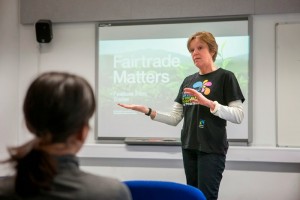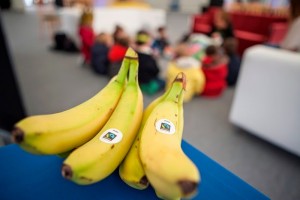 I have just been to one of the Fairtrade Fortnight events, where after a short film, in an animated Q&A session, a small but inquisitive audience learned about what the Fairtrade Foundation is doing and how they have promoted some of the many wonderful and life-changing achievements. They also placed the film ‘Fairtrade Matters’ on their website. Fairtrade has been around for 20 years, and in the UK over three quarters of people recognise the logo, and sales of certified products continue to rise, as does the range of Fairtrade foods available.
I have just been to one of the Fairtrade Fortnight events, where after a short film, in an animated Q&A session, a small but inquisitive audience learned about what the Fairtrade Foundation is doing and how they have promoted some of the many wonderful and life-changing achievements. They also placed the film ‘Fairtrade Matters’ on their website. Fairtrade has been around for 20 years, and in the UK over three quarters of people recognise the logo, and sales of certified products continue to rise, as does the range of Fairtrade foods available.
You may not have noticed some of the changes on availability of these products over time, unless you are –also- obsessive with labels, and keep an eye for new or alternative products in shops and supermarkets, and look for quality assurance marks, ethical credentials, and health claims.
OK, I DO work on food quality, and besides lecturing and having projects with food companies on that subject, I also like my food and I would like to know what is in it, and where it comes from.
I do wonder if it is my personal or professional bias, but most people (or at least those that talk to me) seem to be interested in some aspects of food quality… What is not always so clear is how far we go beyond talking about it when it comes to change some of our ways; for example in choosing local produce over foods that have clocked many food miles, or cooking from scratch, instead of picking something ready-made, or cooking a dish lovingly, instead of watching TV celebrities in kitchens doing their stuff.
It appears to me that the amount of time that people spend watching cooking programmes is inversely proportional to time that people spend cooking…. And probably we buy recipe books and ready meals as a surrogate for the effort, care and time that may take anyone to develop their cooking skills.
And it is not just about cooking, but also about eating. Food does not need to be understood to be appreciated, but it could be appreciated more if we understand it… and if we take the time to do it.
How easy it is to for people to describe the flavours and aromas of what they are eating? Can we tell which herbs and spices a dish has? Or tell the difference between a cup of tea that has been brewed for 3 minutes, for 10 or for a few seconds (and squeezing the bag!)?
 As part of my teaching, we set up some experience-based learning activities in Lab+which aim to understand how our senses work. In answer to my previous question, typically my university students (for example those on BSc (Hons) Dietetics or similar food courses) find it hard to identify (name) aromas of things that they may know, or won’t be able to tell the differences between 2 products. Taste education should be something that starts from childhood, and is developed in families and elsewhere, in events, with friends, or clubs and societies. Practice, attention, and much enjoyment could go a long way.
As part of my teaching, we set up some experience-based learning activities in Lab+which aim to understand how our senses work. In answer to my previous question, typically my university students (for example those on BSc (Hons) Dietetics or similar food courses) find it hard to identify (name) aromas of things that they may know, or won’t be able to tell the differences between 2 products. Taste education should be something that starts from childhood, and is developed in families and elsewhere, in events, with friends, or clubs and societies. Practice, attention, and much enjoyment could go a long way.
In many places in continental Europe, people would be very familiar with food specialities of their region, or their village, down to crop varieties and seasonality. I am sure that many people in Plymouth cannot tell the difference between Cornish and a Devon pasty (besides the origin and looking at the label?), or if the clotted cream should go on top or below the jam on the scones.
But leaving aside cross border controversies, the point is that unless we know and learn to appreciate our foods, we may not have the skill and conviction to choose better. And when I refer to choices, the options and possibilities are endless – which is a good thing, but one which brings responsibility.
Food connects us to nature. Food is basically chemistry (down to what their natural components are), but most food is also biology – most things that we eat are, or have been alive. Whether if it is an apple (probably still breathing and exchanging gases), or yoghurt (still teeming with beneficial microbial life), most probably our foods were parts a plant or animal. Those organisms needed an ecosystem to sustain their life, and those ecosystems needed resources from the planet. And then we have a long and complex chain that typically involve farmers/producers, transport, importers, processors, retailers, catering and someone to cook and eat the stuff.
 By buying or choosing any food (whether we are aware or not) we are making a statement, but we are also connecting to nature, in a direct or indirect way – and we may be contributing to the loss of biodiversity supporting industrial farming of monocultures by global; corporate-driven systems; maybe when we eat more unsustainable meat, we are using more of a fair share of usable land and fresh water, and producing more gas emissions than if we go meatless for a few days… Do we know which fish is in season, locally and from sustainable fisheries? We may be contributing to improve the livelihoods of those in small-farms; or by buying the result of unethical food chains that squeeze producers, we may be driving farmers into poverty and desperation.
By buying or choosing any food (whether we are aware or not) we are making a statement, but we are also connecting to nature, in a direct or indirect way – and we may be contributing to the loss of biodiversity supporting industrial farming of monocultures by global; corporate-driven systems; maybe when we eat more unsustainable meat, we are using more of a fair share of usable land and fresh water, and producing more gas emissions than if we go meatless for a few days… Do we know which fish is in season, locally and from sustainable fisheries? We may be contributing to improve the livelihoods of those in small-farms; or by buying the result of unethical food chains that squeeze producers, we may be driving farmers into poverty and desperation.
As an example, European sugar trade reform is anticipated to grossly affect sugar cane producers across the world as detailed in the Sugar Crash Report by the Fairtrade Foundation. While sugar seems to be the same for most people (when sprinkled over pancakes!), if beet sugar takes over cane sugar, that would be a step back for those communities that depend on this cash crop and that have benefited from the Fairtrade premium income – and indeed for all those at the Foundation that have contributed to build links between producing communities and UK consumers.
 It has crossed my mind, that Fairtrade is just a certification scheme that just scratches the surface, with small worldwide coverage, just a few pence from the price in the UK going to the producers while typically retailers take a bigger slice, and also, may be susceptible to unsavoury issues such as those exposed for other certification schemes (Organic-Soil Association, Farm Assured-Red tractor). On the other hand, they have a tried and tested system to influence and benefit producers’ communities, they have very capable campaigners and a run successful programmes. The recent developments are also very positive, and having read some of the plans for taking the movement further, forming partnerships (a recent link with ‘uppermarket’ Waitrose, expected to combine expertise in retail, ethical trading and supply chain); expanding the range of products (textiles, mining, etc.), and promoting improvements on product quality and safety (another one of my interests).
It has crossed my mind, that Fairtrade is just a certification scheme that just scratches the surface, with small worldwide coverage, just a few pence from the price in the UK going to the producers while typically retailers take a bigger slice, and also, may be susceptible to unsavoury issues such as those exposed for other certification schemes (Organic-Soil Association, Farm Assured-Red tractor). On the other hand, they have a tried and tested system to influence and benefit producers’ communities, they have very capable campaigners and a run successful programmes. The recent developments are also very positive, and having read some of the plans for taking the movement further, forming partnerships (a recent link with ‘uppermarket’ Waitrose, expected to combine expertise in retail, ethical trading and supply chain); expanding the range of products (textiles, mining, etc.), and promoting improvements on product quality and safety (another one of my interests).
Over the years I have been influenced by meeting some of the inspiring producers, enthusiastic staff and hard-working volunteers. So I am convinced that Fairtrade Matters.
There are alternative ways of promoting fairness, cleanliness and goodness of the food that we eat, with many of the global networking and local action examples to be found on the Slow Food Movement. You can get involved from growing your own crops, to talking to those that prepare the food on the restaurants that you visit, from educating yourself about food provenance and ethical credentials to volunteer in a project or suitable campaign. And yes, and we may want to continue buying Fairtrade products… we are a Fairtrade University.
 Dr. Victor Kuri
Dr. Victor Kuri
Food scientist – lecturing in Food Quality at the School of Biological Sciences
Member of the University Fairtrade steering group
